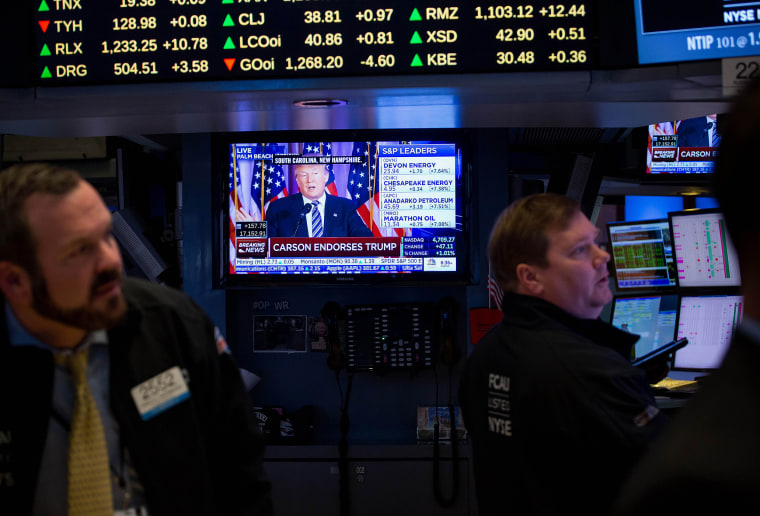Some of Wall Street's most respected voices can't agree on a single 2016 White House contender, but there's one they all seem to agree they don't like.
Speaking to CNBC's "Fast Money" this week, some of the deans of the finance world expressed varying views on the U.S. economy that ranged from calls for a 4 percent interest rate to anticipation of a 10 percent drop in the S&P 500.
However, when it came to politics, bulls and bears alike delivered a universal message: Donald Trump would be a disaster for stocks and trade.
Famed investor Byron Wien of Blackrock, who previously spent 21 years at Morgan Stanley, voiced major concerns when it comes to Donald Trump potential ascension to the White House.
"Donald Trump is attacking Mexico, he's attacking pretty much all of Europe, he's attacking the Muslim religion and he's not denounced the Klu Klux Klan," noted Wien.
"It has been, so far, a difficult year. I think it will be a down year, and I didn't [initially] anticipate Donald Trump's ascendency, but he'll contribute to that," the investor added.
Economists on both the left and right have had choice words for Trump's controversial positions on trade and immigration. Some think his threat to slap tariffs on China could lead to a trade war, or even a global recession. Wien also faulted the billionaire real estate mogul's plans on trade, which could isolate the U.S. economy from major trading partners.
READ MORE: How Bernie Sanders supporters shut down a Donald Trump rally in Chicago
Joseph Grano, who as a key figure in the merger between UBS and PaineWebber and now works as Chairman and CEO of Centurion Holdings, echoed Wien's concerns.
"Donald's got to show us some depth," warned Grano, who also served as Chairman of the Homeland Security Advisory Council. "If he doesn't start acting more presidential, and tone down the hyperbole and the rhetoric, he may get the [GOP] nomination, but I don't think he can win the presidency."
Grano also warned that, given Trump's approach to diplomacy and taxes, that the S&P 500 could drop by 20 percent if he were to be elected president. With this in mind, Grano backed the candidacy of Ohio governor John Kasich.
"What would be good for the government and good for the country: Kasich," explained Grano. "He's a survivor with the best track record and the highest level of pragmatism."
Another point of view was expressed by Asher Edelman, who spent 30 year on Wall Street buying and selling distressed companies. After leaving finance, he established Edelman Arts in New York City to focus on the secondary art market.
When considering the candidates, Edelman didn't hesitate to acknowledge that he's supportive of Senator Bernie Sanders, who is challenging former Secrertary of State Hillary Clinton for the Democratic nomination.
"Bernie is the only person out there who I think is talking at all about fiscal stimulation and banking rules that will get the banks to begin to generate lending again, as opposed to speculation," said Edelman. He addedthat Sanders will ultimately bring more buying power to the masses.
Edelman emphasized that the middle class, when armed with funds, have a greater impact on the U.S. economy than the richest individuals in the country.
"When you have the top one percent getting money, they spend five-ten percent of what they earn. When you have the lower end of the economy getting money, they spend a hundred, or a hundred and ten percent of what they earn. As you've had a transfer of wealth to the top, and a transfer of income to the top, you have a shrinking consumer base," he said.
READ MORE This could swing Florida for Democrats
Abby Joseph Cohen began her career as an economist with the Federal Reserve after graduating from Cornell. Soon after, she joined Goldman Sachs in 1990, earned the title of Managing Director in 1996 and then became a partner in 1998.
Cohen, who rose to prominence with her bullish predictions during the 1990s bull market, explained that a key issue for the next president is comprehensive tax reform
"We're looking for who is proposing the policies that address the underlying issues in the U.S. economy including the disappointing movement in median family income, the need for more robust jobs creation and also the [ongoing] improvement in U.S. innovation and competitiveness," she told CNBC.
Cohen cited data from the Tax Foundation and The Tax Policy Center as think tanks that have crunched the available data from all the candidates. According to the Tax Foundation, Secretary Clinton's plan would bring in an estimated $498 billion over 10 years on a static revenue. Bernie Sanders plan would lead to an estimated $13.5 trillion, however GDP growth under his plan would be -18.6 percent.
By comparison, Secretary Clinton's 10-year GDP growth would be -1.0 percent. Trump's plan would lead to 11.5 percent GDP surge over 10 years, but would cause nearly $12 trillion in losses in static revenue over the course of a decade.
"Bottom Line: [Secretary] Clinton seems to have the most fulsome proposal that's been made thus far," Cohen said.
This story first appeared on NBCNews.com.
